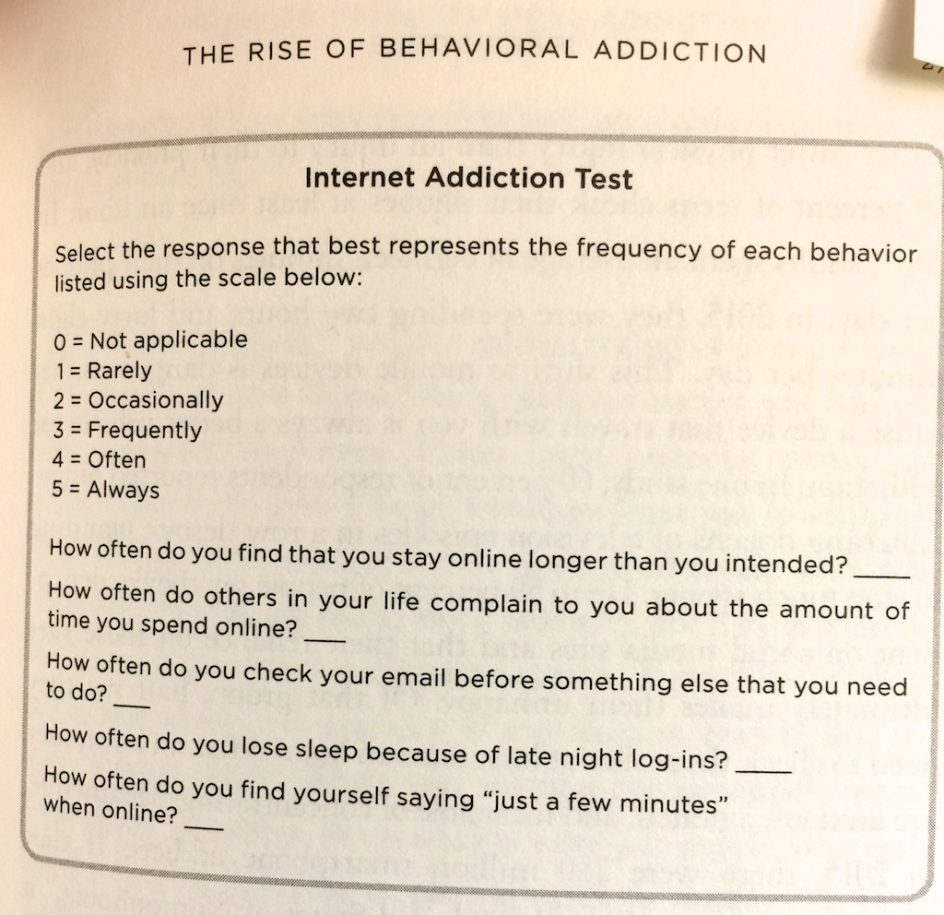
I’m in the middle of a powerful, even ground-breaking book titled Irresistible: The Rise Of Addictive Technology And The Business Of Keeping Us Hooked, by Adam Alter, an author and professor of marketing at NYU’s Stern Business School.
I have to say the book itself is addictive, I had trouble putting it down and it made me rethink some of my own life and habits and change some others. Addictive behaviors have always been around, but as Stern points out, “in recent years they’ve become more common, harder to resist and more mainstream.”
And the ability of programmers and software developers to learn how hook us on in very personal ways on these machines is Orwellian. And chilling. They know how to make us feel good and how to turn us into a new kind of social and behavioral addict. They are profoundly affecting our human relationships, understanding of reality and information, and our basic political values. More than any other thing, they are drawing us into buying things we may not want or even need.
The invention of personal and revolutionary devices like the Ipad and I phone are creating whole new categories of addiction and tens of millions of people are suffering from sleeplessness, mood swings, anger management problems, disconnection and alienation, as well as great distraction from life and work as the result. Many are losing their ability to think for themselves or be alone, and very few of us see what is happening right under our noses: we are becoming addicts.
The people who create new tech products and games are very good at what they do, says Stern, and they have made a science out of hooking us on devices, more than 58 per cent of all Americans say they are online or their devices more than they want or mean to be, and that this is disrupting our lives.
For ninety minutes in 2010, Steve Jobs stood on a California stage and talked about his extraordinary new creation the Ipad, which he said would revolutionize our information gathering. But he refused to let his own children use it, he later told a reporter for the New York Times that the use of technology was severely limited in his home.
Stern calls this new addiction “behavioral,” rather than biological, but shrinks and doctors are beginning to realize that is often just as addictive and is also unhealthy and increasingly widespread. “The good news,” Stern writes, “it that our relationships with behavioral addiction aren’t fixed. There’s much we can do to restore the balance that existed before the age of smartphones, e-mails, wearable tech, social networking and on-demand viewing.”
But there is also much to learn and consider, and much of it is not comforting or pretty. I need to look in the mirror at myself first, as any addict has to do. And I was a valium addict for 30 years, I am sensitive to any suggestion I might be one again. Smartphone screen time usage is exploding in America. More than 50 per cent of smart phone users are using their phones between 2 and 6 hours a day. Only 12 per cent of users have less than an hour’s screen time a day.
Psychologists and researches are finding that smartphones, which increasingly tie us to our work and money and news and shopping and family and friends affect sleep, anger, patience, human relationships and peace of mind. Researchers developed tracking apps for smart phone users several years ago and have found 88 per cent of smart phone users were “overusing” their phones, that is spending more time on them than they needed to or wanted to.
Doctors say young people are often replacing real-time interactions with humans with digital relationships, they often don’t really understand the difference between the two Many young people have not learned how to interact with other people.
This book will get you talking and thinking about yourself and what you may have done to your life.
Alter includes an Internet Addiction Test

Beyond addiction issues, 46 per cent people say they couldn’t bear to live without their smartphones, and 80 per cent of teens check their phones at least once an hour. In 2015, they were spending two hours and forty-eight minutes a day on their phones. Up to 59 per cent of people of all ages say they are now dependent on social media sites, and that their reliance on these sites ultimately makes them angry uncomfortable, anxious, or unhappy.
This, then, has become a huge, even political issue for many Americans, although most people do not see themselves as having this kind of problem.
A few years ago, Facebook was fun. I don’t think anyone thinks it’s fun anymore, Twitter either.
Over the next few weeks, I’m going to write more about this book, and how technology and addiction affects me. Much of my life is now tied to my Iphone, it would be a dramatic transformation in my life and work to give it up or lose it. I do love it, but have always been aware of the dangers. I have some ideas about staying in control and staying healthy.
According to the test, I am not addicted to the Internet, but I am using it more than I would like and it very often does make me frustrated, angry or unhappy. At times, it has greatly affected the quality and duration of rest and sleep.
Alter writes about the profound impact these devices have on our social interactions, our ability to think, to be alone, to make lasting friendships, to have meaningful relationships. I affects the degree to which we are angry, over-stimulated or frightened.
I have experienced some of that. I have also found some solid solutions to these kinds behavioral addiction, and will share them with you. I highly recommend this book, it is well-researched, well written, and essential for almost everyone struggling to deal with the impact of technology on their lives and well-being. I have been writing online for more than 30 years, I am familiar with the issues he raises so well.
I doubt there is anyone reading this who is not thinking about this, especially in recent months. So I’ll share this trip with you, I am grateful to be reading this very excellent book, I recommend it highly. Stay tuned.
